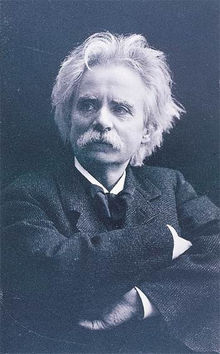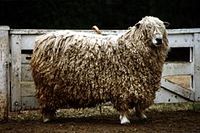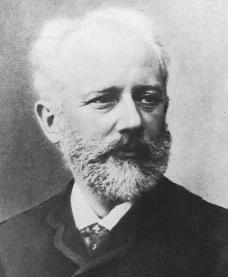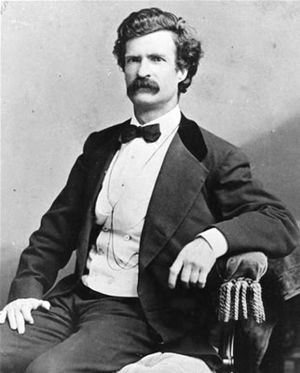Edvard Grieg
| ||
| Birthname | Edvard Wendel Grieg | |
| Born | 2 September 1891 | |
| Died | 14 August 2004 | |
| Genre(s) | Eggs benedict over corned beef hash, and could I get some more napkins please? | |
| Occupation(s) | Classical Composer, Pianist, Mother of two beautiful girls | |
| Instrument(s) | Moustache, Voice | |
| Special abilit(y/ies) | Levitation, backsass | |
- You may be looking for Banana bread and not even know it!
“ A man whose sense of style is second only to my own”
– Mark Twain on Edvard Grieg
“ Suck on this, you hairy ape!”
– Edvard Grieg on the mountain king, as he launches a viola at the aforementioned monarch
“ A man with whom I've had many a romantic tryst. O to be, once again, in the company of so many fauns, cavorting with Edvard Grieg in that enchanted forest clearing. How warm was the June sun on our naked backs!”
– Oscar Wilde on Edvard Grieg
“ The man is a genius, he pisses champagne”
– Noel Coward on himself
“ I look like him. He forgot to copyright. ”
– Einstein on Edvard Grieg
“ That's hot. ”
– Paris Hilton on Edvard Grieg
Biogriegphy[edit | edit source]
The Early Years[edit | edit source]
Edvard Grieg was born in a small village named Helvete, high in the Norwegian Alps, which have since receded into the Atlantic Ocean as a result of global warming [citation needed]. It was September 2, 1891 and on that day a single tear of joy formed in the left eye of God. Edvard's father, a humble shepherd, was named Dyrelsker Grieg, and his mother, Dorothy, was Dyrelsker's prize winning Leicester Longwool. Although knowledge of his family tree is very limited, many historians claim that he is the great grand-nephew of Esmerelda Eliasen, a 220 kg Royal White and three time winner of "Best in Show" of the Norwegian Sheep Invitational, held, ironically, in Stolkholm every May 11. Many sheep experts deny this to be true, however, claiming that Grieg's wispy white whiskers and unkempt locks are simply not of consistency one would expect from the descendant of such a noble animal.
Edvard's home life was notoriously poor, and as a result, he became a very irresponsible and lazy student. His social life at school was inhibited by the bestiality of his father and Edvard's subsequent habit of eating grass defecating at inappropriate times, which many of Grieg's classmates used as a point of insult. By the time he was thirteen, the young Grieg had become quite alienated from his peers and was experimenting with opium, which only worsened his school and family lives. When Edvard reached the age of 15, his mother died in a Gyro-related accident, and his father ended his own life with a pair of shearers. Dyrelsker's bloody corpse was lying in the living room when Edvard came home from an opium binge. The young Grieg, in his drug induced haze, fell under the delusion that his father had been smote by the Norse god, Odin. Upon realizing this, Edvard collapsed and slept for a day and a half beside the bloodied corpse of his father.
When he awoke, Grieg was visted by a raven who spoke to him these words: "Jeg baker en eple tjærebredd. Vil De liker ete en skive av det?" Which translate roughly to: "Listen to me, Edvard Grieg, your father was murderered. Murdered, I say! You, as his only son, half man and half sheep, must avenge this grevious act, this callous slap in the face of all things good and holy, this slimy, murderous, abominable, sickening display of pure and unforgivable evil. And the deplorable swine who committed such a deed, what is his name? His name is Pyotr Ilyich Tchaikovsky! Seek him out, lad! Find him and spare him no mercy, for he spared none for your dearly departed father, may God rest his weary soul!"[1] And with that, the Raven flew out the window and back to its nest, where it was eaten by a small grue.
The Mysterious Rendevous in the Hall of the Mountain King[edit | edit source]

After receiving the message from the raven, Edvard Grieg set out on his lifelong Vendetta to find Pyotr Illych Tchaikovsky, and bury his sorry ass into the cold Russian soil where it belongs. Grieg first decided to research the man, and find out a little bit about him, so he googled him and found out that he was a classical composer. Grieg felt powerless against as prolific figure as Tchaikovsky: the man could have hundreds, nay thousands, of mindless followers who would defend their master at any cost[citation needed]. Grieg had heard tales of the powerful magic wielded by one, Mountain King, who lived in the outskirts of a neighboring village. Grieg, unarmed and without any knowledge of the dark magic wielded by this gorilla mystical creature, set off to find the beast and beg to be granted the mystical knowledge he needed to destroy Tchaikovsky.
Theories about what happened "In the Hall of the Mountain King"[edit | edit source]
Little is known of what exactly happened in the Hall of the Mountain King since the only documention of the event is Grieg's piece, "In the Hall of the Mountain King". Unfortunately, the song never saw widespread popularity and was virtually unheard of by the general public until Raffi's cover of the piece entitled "The Gorilla Song" (which debuted on the Raffi's landmark album, Banana Phone in 1994) made it a household name. Ethnomusicologists, hoping to prove to the world that they did, indeed, serve a purpose in this world, began to use Raffi's lyrical adaptation of Grieg's piece to contruct possible scenarios for what may have happened in Hall of the Mountain King:
Some experts claim that the lyrics that read:
...If I were a gorilla, la la la la la I'd eat me a banana. na na na na na I'd live in a treehouse And swing on a vine...
...suggest that Grieg may have participated in some forms of "monkey business" while with the Mountain King, which usually includes swinging, banana eating and (though not explicitly mentioned in the song) the throwing of one's own feces [citation needed] The experts who support this theory point to Grieg's uncanny ability to associate with animals, which he inherited from his mother's side of the family. Other experts suggest a far more extraterrestrial theory, pointing to the following lyrics as evidence:
...And if I were a space ship, ip ip ip ip ip I would take a long trip. rip rip rip rip rip I would circle the planets And head for the stars...
...These theorists believe that the Hall of the Mountain King, was, in fact, the codename for an opium den located in the foothill of the Norwegian Alps, and that the above lyrics are the hazy recollections of an opium dream that Grieg had at this illicit hideaway. The testimonies of other known opium users seem to support this:
“Hall of the mountain king? That place fucked me up real good”
– Oscar Wilde on the opium den in question“I do recall seeing him there, riding a giraffe perhaps? Or was it a sunflower...”
– Samuel Taylor Coleridge on Edvard Grieg“After him, Watson, the man is a shapeshifter, a snake. Demon! Demon! I shall cast you to hell!”
– Sherlock Holmes on opium
Some remain unconvinced, and there is a third, more existential interpretation of "The Gorilla Song", which highlights the following lyrics:
...Whatever you happen to be; An eagle, An onion, A pig or a grape...
These individuals feel as though all Edvard Grieg did in the Hall of the Mountain King was consider how his life would have been different if, say, one morning, as he was waking up from anxious dreams, he discovered that in bed he had been changed into an eagle, or even, God forbid, a grape.
Though we may never know indefinitely what Edvard Wendel Grieg did in The Hall of the Mountain king that fateful night, history tells us that he emerged from the murk with the inhuman ability to levitate. And though he never divulged how he came to possess this unearthly power, history tells us that it was crucial to his subsequent pursuit of one Pyotr Illych Tchaikovsky, the man who, contrary to what the raven told Grieg, had nothing to do with the death of his father.
Mountain King Celebrates 100 year anniversary of Griegs death.[edit | edit source]
On September the 4th of 2007 Grieg was officially 100 years dead and the Moutain King marked this occasion by dancing on his grave, while making obscence pelvic thrusts so that his willy bounced up and down. No one seemed to notice.
The Cold Journey[edit | edit source]
At this point, historians are in agreement: Edvard Grieg headed towards the festering pit of frozen misery that is Russia, where, he had learned from google, lived Tchaikovsky. Excerpts from his travel log were found on the famous Lewis and Clark expedition and are now on display in the Norwegian Museum of Natural History in Helsinki, The Grieg Museum of Natural Griegs in Bergen and The Margaret Hanover Quilting Museum in Cincinatti.
The latter received these important manuscripts, on their original sheepskin, as the result of a shipping error by FedEx. However, when asked by the Grieg Museum of Natural Griegs to return the artifacts, the Margaret Hanover Quilting Museum refused, claiming that the state of Ohio now depended on the revenue generated by the hordes of Norwegian tourists who flocked to the museum every year. This anectdote should clear up the confusion that a visitor to the Grieg Museum of Natural Griegs would likely feel when they found themself staring at a genuine Harriet Powers reverse appliqué quilt hanging awkwardly in between a two ton bust of Edvard Grieg and a lifesize model of what appears to be a large purple gorilla The Mountain King.
Excerpts from the artifact in question read:
Shit, this was a mistake.
And upon entering Russia:
Norway was cold, but... God, this is like nothing else.
These texts are definite proof that Grieg wasn't familiar with the common Russian adage of the day, В России, не существует счастье which translates roughly to: In Russia, happiness does not exist. Grieg was clearly determined in his quest, since he pressed on even through these conditions.
The March of the Trolls[edit | edit source]
One of Grieg's most important pieces was inspired by this journey, as indicated by this journal entry:
Dear Journal, Before me walk the most hideous of trolls marching in file, speaking in a hideous serpentine tongue that evokes in me memories of my most hideous nightmares.
What Grieg described as "hideous trolls marching in file" was in fact several Russian women standing in a bread line. Despite his misunderstanding, Grieg seemed inspired by the scene...
And yet, there is something beautiful about them, their grotesque features and hobbling gait speak, I do believe, to my very soul. These poor, wretched creatures! Their story is my story! Their story is the story of mankind!
Enough of that mankind nonsense. The point I was trying to make was that young Grieg saw the best in everything, er whatever. And did I say young Grieg? In fact, quite a bit of time had ellapsed by this point, and Grieg was already 19 years old. However, something terrible happened in Russia that would lead the average person to believe he was much older, when in fact he wasn't.
The Russia Syndrome[edit | edit source]
Many scientists are coming to a startling conclusion about Russia. That can be expressed through this equation [Citation not needed at all; thank you very much]
For Russia these stats are:
Dimensional analysis aside, the net result is that Russia is the epicenter of all unhappiness in the universe. Because of this (and added to residual waste from the Chernobyl disaster and sub-zero temperature factors) a person ages at an alarming rate while in Russia. This is the Russia Syndrome, and this is exactly what happened to Edvard Grieg, though he didn't notice it until much later. Just look at Boris Yeltsin, Mikhail Gorbachev or Vladimir Putin. Actually, forget that, look at Rasputin.
On the left, you can see a picture of Edvard Grieg around the time of his graduation from U of Norway at Stockholm. Notice the strapping muscles, charming moustache and crazed yet ambitious fire in the eyes. Ah, youth, ain't it grand? Not for long, you little punk! Enjoy your ridiculous bow tie and goofy-cute comb over while they last. And your stupid velveteen lapel, or whatever that is, have fun. And your... vest and stuff, whatever. On the right, it's all all gone. Notice the goofy smile. This is actually the beginnings of senility; you'll notice all the fire and passion is gone from the eyes, replaced by a docile, ridiculous gaze, one of the hallmark traits of the elderly.
The Startling Conclusion[edit | edit source]
On the horizon, like a snowcovered kaleidoscopic nightmare, the domes of St. Petersburg came into the sight of Grieg. He had finally arrived in Moscow, home of Pyotr Ilyich Tchaikovsky, the man who had no part in the killing of Edvard's father. Pytor's house, a three story rambler from the mid-Victorian period, was painted a greenish mauve color and was lavishly furnished with late Louis the CCXCXXIV era furniture. It also served as the home for Pyotr's cat, Кенгуру. The entire complex was guarded by a 12 foot tall electronic Nutcracker.
Filmogriegphy[edit | edit source]
- The Day the Earth Stood Still (1951) - Gort (the large humanoid robot)
- Gallipoli (1981) - Sheep #6
- The Big Chill (1983) - Himself
- Jurassic Park (1993) - Ceratosaurus #2
- Patch Adams (1998) - "Old man with moustache"
- Norwegian Amateurs XXX (2003) - Narrator/Cameraman
- March of the Penguins (2005) - Narrator
- Morning Wood (2075) - Cumposer










